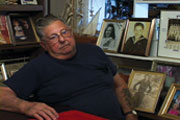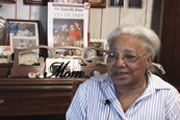Teaching Students to Capture Oral Histories
By Kathy Seale
 |
 |
Wilbur Goode (top) and Rosedale resident Doris Cunningham (bottom) reflected on camera for students in a new UAB history class. |
Stories are an inseparable part of history. In all the long ages of human drama on planet Earth, the tales that have been told tend to focus on big names and the big picture: wars, politics, economics. But a new course at UAB is helping students train the lens of history in the opposite direction.
Last fall, historians Pamela King and Staci Glover, along with visual and applied anthropologist Rosie O’Beirne, debuted Untold Stories: Finding and Telling Stories You Haven’t Heard in History Class. Participants studied the timelines of three Birmingham-area communities, then ventured into the streets to conduct filmed interviews with residents.
King, director of undergraduate programs in the history department, shared her research into the rise, ruin, and rebirth of north Birmingham’s Norwood community. Glover, an adjunct history instructor, taught students about Brookside, a northwestern Jefferson County town with strong Eastern European roots. O’Beirne, co-director of UAB’s Digital Community Studies program, focused on historically African-American Rosedale in Homewood.
For history major Ashlen Pettry, the course was a revelation. She heard firsthand how a young white man’s newspaper route, which he expanded to include a black neighborhood, helped him break down his personal racial barriers in the 1950s. “Instead of reading a perspective off a page, you get to talk to someone who was there,” the recent UAB graduate says. “It sheds a whole new light on what you thought you knew.” The course also helped with her future career, Pettry adds. “My ultimate goal is medical school. To be able to work with patients and elicit responses is extremely important.”
For history major Ashley Wilson, the class also offered an unexpected bonus. During a practice interview with her father, she learned the story of her own family, including its medical history. Someday, she’d like to return the favor. “I try to be more observant and remember things, so that at some point I can give someone an oral history.”
In addition to practical lessons in interviewing techniques, students learned digital videography, video editing, and digital archiving. The history department plans to continue to offer oral history classes on a range of different topics. In the meantime, Untold Stories provided a framework for Community Ethnography, a course O’Beirne is teaching in the fall 2010 semester in which students will edit and shape existing interview material into video-based exhibits for Birmingham’s future Red Mountain Park.